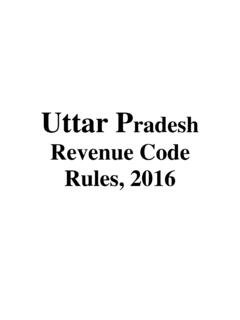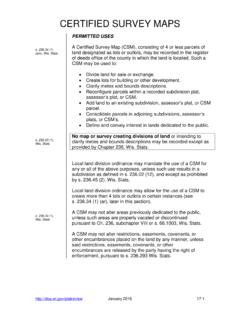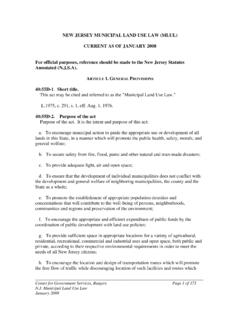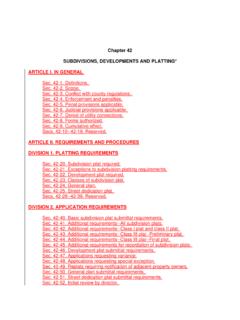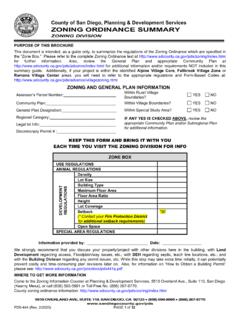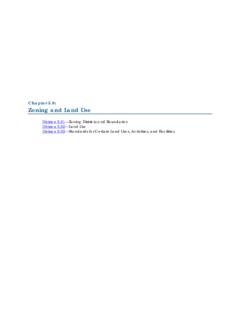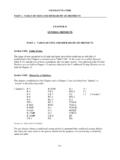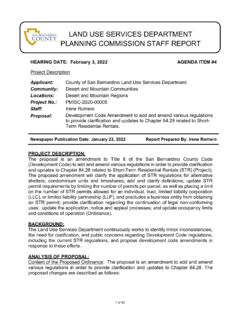Transcription of UTTAR PRADESH REVENUE CODE, 2006 - UP
1 1 UTTAR PRADESH REVENUE code , 2006 ( Act of 2012) (As amended by ordinance of 2015 and corrected by notification dated 18 December, 2015) 1 CHAPTER I PRELIMINARY Short title, extent and commencement. - (1) This Act may be called the UTTAR PRADESH REVENUE code , 2006 . (2) It extends to the whole of UTTAR PRADESH . (3) It shall come into force on such date as the State Government may, by notification, appoint, and different dates may be appointed for different areas or for different provisions of this code . 2 Applicability of the code . - The provisions of this code , except Chapters VIII and IX shall apply to the whole of UTTAR PRADESH , and Chapters VIII and IX shall apply to the areas to which any of the enactments specified at serial numbers 19 and 25 of the First Schedule was applicable on the date immediately preceding their repeal by this code .
2 3 Extension of the code to new (1) Where after the commencement of this code , any area is added to the territory of UTTAR PRADESH , the State Government may, by notification, extend the whole or any provision of this code , to such area. (2) Where any notification is issued under sub-section (1), the provisions of any Act, rule or regulation in force in the area referred to in the said sub-section, which are inconsistent with the provisions so applied, shall be deemed to have been repealed. (3) The State Government may, by a subsequent notification, amend, modify or alter any notification issued under sub-section (1). 2 4 this code ,- (1) abadi or village abadi means such area in a village which, on the date of commencement of this code , is being used for the purposes of residence of its inhabitants or for purposes ancillary thereto such as sahan and green trees, wells etc.
3 Or which may have been or be hereafter reserved for such use; (2) agriculture includes horticulture, animal husbandry, pisciculture, flower farming, bee keeping and poultry farming; (3) agricultural labourer means a person whose main source of livelihood is manual labour on agricultural land ; (4) bank shall have the meaning assigned to it in the UTTAR PRADESH Regulation of Money Lending Act, 1976; (5) Bhumi Prabandhak Samiti means a Bhumi Prabandhak Samiti constituted under section 28-A of the Panchayat Raj Act, 1947; (6) Board means the Board of REVENUE constituted or deemed to be constituted under section 7; (7) charitable institution means any establishment, undertaking, organisation or association formed for a charitable purpose, and includes a specific endowment; (8) Collector means an officer appointed as such by the State Government under sub-section (1) of section 12, and shall include- (a) an Additional Collector appointed by the State Government under sub-section (2) of the said section; and (b) an Assistant Collector of the first class empowered by the State Government by notification to discharge all or any of the functions of a Collector under this code ; (9) Consolidated Gaon Fund means the Consolidated Gaon Fund constituted under section 69.
4 (10) family , in relation to a tenure-holder, means himself or herself and his wife or her husband, as the case may be, (other than a judicially separated wife or 3 husband), minor sons and minor daughters other than married daughters: Provided that where the question relates to the transfer of any land and the transferee is a minor, the expression family shall include the parents of such minor; (11) grove land means any specific part of land in a holding having trees (not including papaya or banana plants) planted thereon in such manner that they preclude, or when full grown will preclude, the land or any considerable portion thereof from being used primarily for any other purpose, and the trees on such land shall constitute a grove; (12) holding means a parcel of lands held under one tenure or one lease, engagement or grant; (13) improvement , in relation to a holding, means any work which adds materially to the value of the holding which is suitable thereto and consistent with the purpose for which it is held and which, if not executed on the holding, is either executed directly for its benefit or is, after execution, made directly beneficial to it, and, subject to the foregoing provisions, includes- (i) the construction of tanks, wells, water channels, embankments and other works for storage, supply or distribution of water for agricultural purposes; (ii) the construction of works for the drainage of land or for the protection of land from floods, or from erosion or other damage from water.
5 (iii) the planting of trees and the reclaiming, clearing, enclosing, leveling or terracing of land ; (iv) the erection of buildings on, or in the vicinity of the holding elsewhere than in an abadi or urban area, required for the convenient or profitable use or occupation of the holding; and (v) the renewal or reconstruction of any of the foregoing works, or alteration therein or additions thereto; (14) land , except in Chapters VII and VIII and sections 80, 81 and section 136, 4 means land held or occupied for purposes connected with agriculture; (15) land holder means the person to whom rent is or but for a contract, express or implied, would be payable; (16) REVENUE Court means all or any of the following authorities (that is to say) the Board and all members thereof, Commissioners, Additional Commissioners, Collectors, Additional Collectors, Chief REVENUE Officers, Assistant Collectors, Settlement Officers, Assistant Settlement Officers, Record Officers, Assistant Record Officers, Tahsildars, Tahsildars (Judicial) and Naib Tahsildars; (17) REVENUE Officer means the Commissioner, an Additional Commissioner, the Collector, an Additional Collector, the Chief REVENUE Officer, the Sub-Divisional Officer, an Assistant Collector, the Settlement Officer, an Assistant Settlement Officer, the Record Officer, an Assistant Record Officer, the Tahsildar, the Tahsildar (Judicial), the Naib Tahsildar and the REVENUE Inspector.
6 (18) Sub-Divisional Officer means the Assistant Collector in charge of the Tahsil; (19) taungya plantation means the system of afforestation in which the plantation of trees is, in the earlier stages, done simultaneously with the cultivation of agricultural crops which ceases, when trees so planted begin to form a canopy, rendering the cultivation of agricultural crops impossible; (20) village means any local area whether compact or otherwise, recorded as a village in the REVENUE records of the district concerned, and includes an area which the State Government may, by general or special notification, declare to be a village; (21) village artisan means a person whose main source of livelihood is manufacture or repair of traditional tools, implements and other articles or things used for agriculture or purposes ancillary thereto, and includes a carpenter, weaver, potter, blacksmith, silversmith, goldsmith, barbar, washerman, cobbler or 5 any other person who normally earns his livelihood by practising a craft either by his own labour or by labour of any member of his family in any village; (22) words and expressions Gaon Fund , Gram Sabha and Gram Panchayat shall have the meanings assigned to them in the Panchayat Raj Act, 1947; (23) agricultural year means an year which begins from the first day of July and ends on thirtieth day of June of a calendar year.
7 It is also characterised as fasli year ; (24) intermediary with reference to any estate means a proprietor, under-proprietor, sub-proprietor, thekedar, permanent lessee in Avadh and permanent tenure-holder of such estate or part thereof; (25) lease in relation to mines and minerals shall include a sub-lease, a prospecting lease and an agreement to lease or sublet, and lessee shall be construed accordingly; (26) decree shall have the meaning assigned to it in the code of Civil Procedure, 1908 (Act of 1908); (27) State Government means the Government of UTTAR PRADESH ; (28) Central Government shall have the meaning assigned to it in section 3 of the General Clauses Act, 1897 (Act of 1897); (29) Minjumla number means a shajra number denoting a component part of a field which has theoretically been partitioned but physically has not been partitioned.
8 5 CHAPTER II REVENUE DIVISIONS division of State into REVENUE For the purposes of this code , the State shall be divided into REVENUE areas comprising of divisions which may consist of two or more districts, and each district may consist of two or more Tahsils and each Tahsil may consist of one or more parganas, and each 6 pargana may consist of two or more villages. 6 Constitution of REVENUE (1) The State Government may, by notification, specify- (i) the districts which constitute a division ; (ii) the tahsils which constitute a district; (iii) the villages which constitute a tahsil. (2) The State Government may, by notification, alter the limits of any REVENUE area referred to in sub-section (1) by amalgamation, re-adjustment, division or in any other manner whatsoever, or abolish any such REVENUE area and may name and alter the name of any such REVENUE area, and in any case where any area is renamed, then all references in any law or instrument or other document to the area under its original name shall be deemed to be references to the areas as renamed unless expressly provided otherwise: Provided that before passing any order under this sub-section on any proposal to alter the limits of any REVENUE area, the State Government shall publish, in the prescribed manner, such proposals for inviting objections, and shall take into consideration any objection to such proposals.
9 (3) The Collector may, by an order, published in the prescribed manner, arrange the villages in a tahsil into Lekhpal circles and the Lekhpal circles into REVENUE Inspector circles and specify also the headquarters of each REVENUE Inspector within his Circle. (4) The divisions, districts, tahsils, parganas, REVENUE Inspector circles, Lekhpal circles and villages, as existing at the commencement of this code shall, until altered under the preceding sub-sections, be deemed to be the REVENUE areas specified under this section. 7 Chapter III BOARD AND THE REVENUE OFFICERS Board of (1) There shall be a Board of REVENUE for UTTAR PRADESH 7 consisting of a Chairman and such other members as the State Government may, from time to time, appoint: Provided that the Board as constituted and functioning immediately before the commencement of this code shall be deemed to be the Board constituted under this section.
10 (2) (deleted). (3) No person shall be qualified for appointment as: (a) an Administrative Member of the Board, unless he has held an office not lower in rank than that of a Commissioner; (b) a Judicial Member of the Board, unless he has held an office not below the rank of a Collector. (4) The State Government may, at the time of making the appointment or at any time subsequent thereto, designate any member, as Judicial Member of the Board, and any such member shall be allotted only judicial business. 8 Jurisdiction of the (1) The Board shall be the Chief Controlling Authority- (a) in all matters relating to disposal of cases, appeals or revisions; and (b) subject to the superintendence, direction and control of the State Government, in all other matters provided in this code . (2) Subject to the provisions of the sub-section (1), the Board shall exercise, perform and discharge powers, functions and duties conferred upon it by or under this code or any other law for the time being in force.
